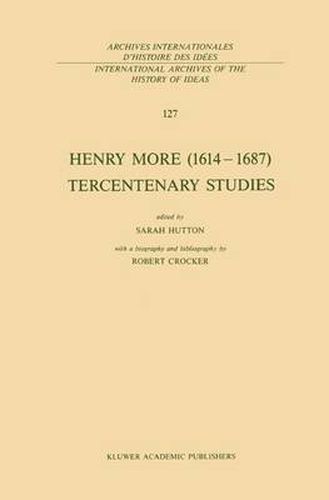Readings Newsletter
Become a Readings Member to make your shopping experience even easier.
Sign in or sign up for free!
You’re not far away from qualifying for FREE standard shipping within Australia
You’ve qualified for FREE standard shipping within Australia
The cart is loading…






This title is printed to order. This book may have been self-published. If so, we cannot guarantee the quality of the content. In the main most books will have gone through the editing process however some may not. We therefore suggest that you be aware of this before ordering this book. If in doubt check either the author or publisher’s details as we are unable to accept any returns unless they are faulty. Please contact us if you have any questions.
Of all the Cambridge Platonists, Henry More has attracted the most scholar ly interest in recent years, as the nature and significance of his contribution to the history of thought has come to be better understood. This revival of interest is in marked contrast to the neglect of More’s writings lamented even by his first biographer, Richard Ward, a regret echoed two centuries after his 1 death. Since then such attention as there has been to More has not always served him well. He has been dismissed as credulous on account of his belief in witchcraft while his reputation as the most mystical of the Cambridge 2 school has undermined his reputation as a philosopher. Much of the interest in More in the present century has tended to focus on one particular aspect of his writing. There has been considerable interest in his poems. And he has come to the attention of philosophers thanks to his having corresponded with Descartes. Latterly, however, interest in More has been rekindled by renewed interest in the intellectual history of the seventeenth century and Renaissance. And More has been studied in the context of seventeenth-cen tury science and the wider context of seventeenth-century philosophy. Since More is a figure who belongs to the Renaissance tradition of unified sapientia he is not easily compartmentalised in the categories of modern disciplines. Inevitably discussion of anyone aspect of his thought involves other aspects.
$9.00 standard shipping within Australia
FREE standard shipping within Australia for orders over $100.00
Express & International shipping calculated at checkout
This title is printed to order. This book may have been self-published. If so, we cannot guarantee the quality of the content. In the main most books will have gone through the editing process however some may not. We therefore suggest that you be aware of this before ordering this book. If in doubt check either the author or publisher’s details as we are unable to accept any returns unless they are faulty. Please contact us if you have any questions.
Of all the Cambridge Platonists, Henry More has attracted the most scholar ly interest in recent years, as the nature and significance of his contribution to the history of thought has come to be better understood. This revival of interest is in marked contrast to the neglect of More’s writings lamented even by his first biographer, Richard Ward, a regret echoed two centuries after his 1 death. Since then such attention as there has been to More has not always served him well. He has been dismissed as credulous on account of his belief in witchcraft while his reputation as the most mystical of the Cambridge 2 school has undermined his reputation as a philosopher. Much of the interest in More in the present century has tended to focus on one particular aspect of his writing. There has been considerable interest in his poems. And he has come to the attention of philosophers thanks to his having corresponded with Descartes. Latterly, however, interest in More has been rekindled by renewed interest in the intellectual history of the seventeenth century and Renaissance. And More has been studied in the context of seventeenth-cen tury science and the wider context of seventeenth-century philosophy. Since More is a figure who belongs to the Renaissance tradition of unified sapientia he is not easily compartmentalised in the categories of modern disciplines. Inevitably discussion of anyone aspect of his thought involves other aspects.